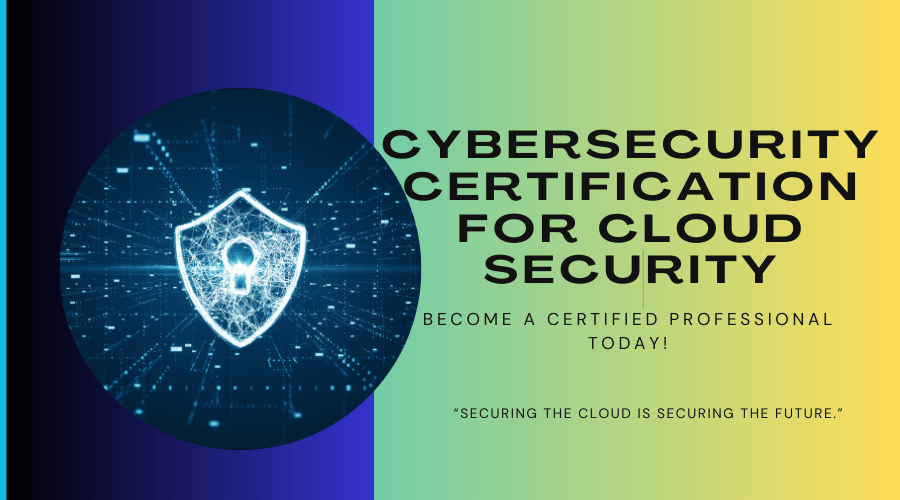Cloud security is no longer just an IT concern—it’s a necessity for businesses and individuals alike. With the rapid adoption of cloud computing, securing data, applications, and infrastructure has never been more critical.
Whether you choose an entry-level cloud security certification or a specialized one like the Certified Cloud Security Professional (CCSP), these credentials showcase your expertise and Prepsaret has the perfect resources to help you attain them.
What is Cloud Security in Cybersecurity?
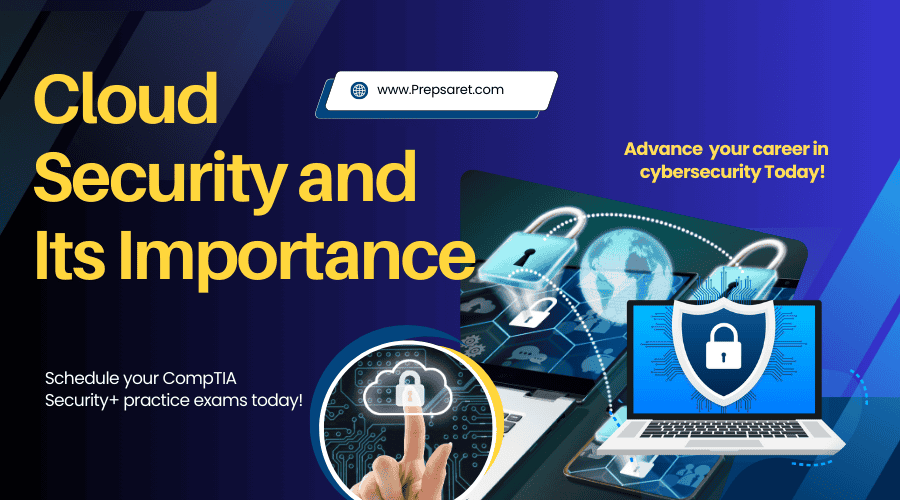
Cloud security refers to the strategies, technologies, and policies used to protect cloud-based systems, data, and applications from cyber threats. Unlike traditional IT security, which focuses on securing on-premise systems, cloud security involves protecting assets stored and accessed over the internet.
Cyber threats are evolving, and attackers are constantly targeting cloud environments, making strong security measures essential.
So, how do you prove your expertise in cloud security? That’s where cybersecurity certifications for cloud security come in. These certifications validate your knowledge, skills, and ability to protect cloud-based systems from cyber threats.
Whether you are looking for a free cybersecurity certification for cloud security to get started or an advanced certification to solidify your expertise, the right credential can help you stand out.
The demand for cloud security professionals is skyrocketing as organizations move their operations to the cloud. By earning a cloud security certification, you can set yourself apart, boost your career, and become a trusted expert in cloud security.
Key Components of Cloud Security:
- Data Encryption – Ensures sensitive information remains unreadable to unauthorized users.
- Identity and Access Management (IAM) – Controls user access to cloud resources.
- Network Security – Protects cloud environments from unauthorized access and cyberattacks.
- Threat Detection and Response – Identifies and mitigates potential security threats in real time.
Cloud security plays a crucial role in safeguarding businesses from data breaches, ransomware attacks, and compliance violations.
Certifications such as the CCSK certification (Certificate of Cloud Security Knowledge) and the GIAC Cloud Security Essentials (GCLD) validate knowledge in these areas.
Understanding the Shared Responsibility Model in Cloud Security
Cloud security isn’t just the cloud provider’s responsibility—it’s a shared effort between providers and customers. This is known as the Shared Responsibility Model, where both parties play distinct roles in securing cloud environments.
Read on: Cybersecurity Certification for Beginners
Responsibilities Based on Cloud Service Models:
- Infrastructure as a Service (IaaS) – Cloud providers secure the physical infrastructure, while customers manage OS, applications, and data security.
- Platform as a Service (PaaS) – Providers secure the underlying platform, while customers protect their applications and data.
- Software as a Service (SaaS) – Providers manage most security aspects, but customers must ensure data protection and user access controls.
Differences Between Cloud Security and Traditional Cybersecurity
While traditional cybersecurity focuses on protecting on-premise systems, cloud security has unique challenges and approaches. Here’s how they compare:
| Aspect | Traditional Cybersecurity | Cloud Security |
| Infrastructure | Secures on-premise servers and networks | Protects virtualized cloud environments |
| Data Storage | Data is stored in physical locations controlled by the company | Data is stored in third-party cloud data centers |
| Security Challenges | Physical security, internal threats | Multi-tenancy, data sovereignty, compliance |
| Security Tools | Firewalls, antivirus software, network monitoring | Cloud compliance certification, cloud access security brokers (CASB), identity management, encryption |
As businesses shift to cloud computing, cybersecurity strategies must adapt to protect cloud-native environments effectively. Many professionals follow a cloud security certification path, starting with foundational certifications and progressing to advanced ones.
Importance of Cybersecurity Certifications for Cloud Security
Earning a cybersecurity certification for cloud security can set you apart in today’s competitive job market. Here’s why:
- Proves Your Expertise – Certifications demonstrate your ability to secure cloud environments against modern threats.
- Keeps You Updated – The cloud security landscape is constantly evolving, and certifications help professionals stay ahead of emerging risks.
- Increases Career Opportunities – Employers seek certified cloud security professionals to fill critical roles in IT security.
Best Cybersecurity Certifications for Cloud Security Professionals
Cloud security is more important than ever, and the right certification can boost your career and earning potential. But with so many options available, which one should you choose?
Let’s explore the best cloud security certifications and how they can help you stand out in the industry.
Vendor-Neutral vs. Vendor-Specific Certifications
Before diving into specific certifications, it’s important to understand the difference between vendor-neutral and vendor-specific certifications.
- Vendor-neutral certifications (like CompTIA Security+, CCSK certification, and Certified Cloud Security Professional (CCSP)) cover general cloud security principles applicable across multiple platforms.
- Vendor-specific certifications (like Google Cloud Security certification, AWS Certified Security – Specialty, and Microsoft Certified: Security, Compliance, and Identity Fundamentals) focus on securing a particular cloud service provider’s environment.
Both types are valuable, and the best cybersecurity certification for cloud security depends on your career goals and the cloud platforms you plan to work with.
Security+ vs. Other Cloud Security Certifications: A Comparison
CompTIA Security+ is widely regarded as a foundational cybersecurity certification. While not cloud-specific, it covers essential security concepts that apply to cloud environments, such as:
- Network security
- Risk management
- Identity and access management
- Cryptography
How Security+ Compares to Other Certifications
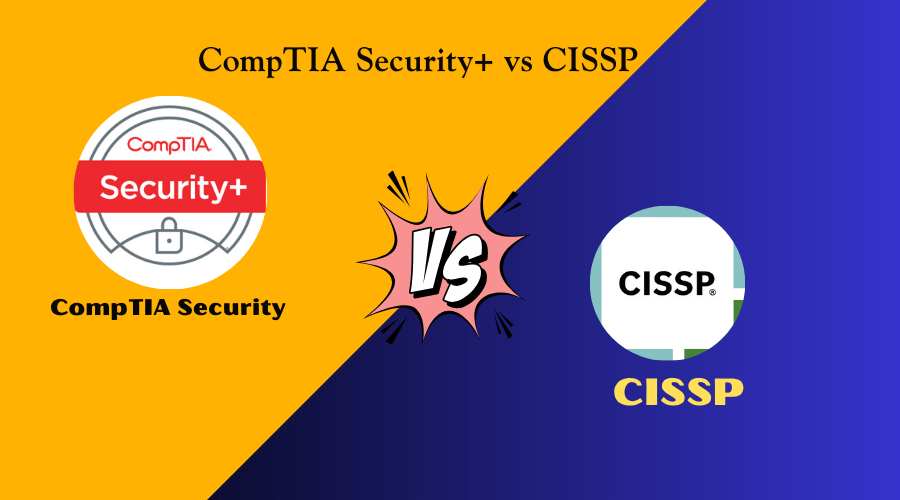
| Certification | Focus Area | Best For |
| Certified Cloud Security Professional (CCSP) | Advanced cloud security architecture & governance | Senior cloud security roles |
| CCSK certification (Certificate of Cloud Security Knowledge) | Cloud security fundamentals | Entry-level to mid-level cloud security professionals |
| GIAC Cloud Security Essentials (GCLD) | Cloud security operations & best practices | Security engineers & analysts |
| Google Cloud Security certification | Security for Google Cloud environments | Google Cloud professionals |
Learn more: CompTIA Security+ vs CISSP
Which Certification Is Best for You?
- Entry-level IT professionals: Start with Security+ or an entry-level cloud security certification such as CCSK.
- Cloud security specialists: Consider CCSP, GCLD, or vendor-specific certifications like AWS or Google Cloud Security certification.
- AWS, Google, or Microsoft cloud security professionals: Choose the respective vendor certification.
As cloud security certifications 2025 continue to evolve, staying up to date with cloud security training and certifications will be essential for career growth.
Whether you’re looking for a free cybersecurity certification for cloud security or investing in a specialized program, the right credential can open doors to new opportunities.
Continue reading: Cybersecurity News
CompTIA Security+ and Its Role in Cloud Security
Security+ is often the first cybersecurity certification professionals pursue. But how does it apply to cloud security?
Fundamental Security Concepts
Security+ lays the groundwork for understanding cloud security risks and mitigation strategies, including identity and access management (IAM) in the cloud, virtualization and cloud architecture, and incident response in cloud environments.
Network Security and Risk Management
These topics are crucial for protecting cloud environments from attacks and data breaches. Security+ also introduces concepts relevant to cloud governance and compliance training, ensuring professionals understand regulatory frameworks.
A Stepping Stone
Security+ is an excellent launchpad for more advanced cloud security certifications, such as Certified Cloud Security Professional (CCSP) or vendor-specific options like AWS, Azure, and Google Cloud.
How to Prepare for a Cloud Security Certification Exam
Studying for a cloud auditing certification or any cloud security credential can feel overwhelming, but with the right approach, you can ace your exam.
General Study Strategies
- Set a study schedule and stick to it.
- Use multiple study resources, such as official guides, online courses, and books.
- Take practice exams to assess your readiness and identify weak areas.
- Engage in hands-on labs to gain practical experience with incident response in cloud environments.
Recommended Study Materials and Resources
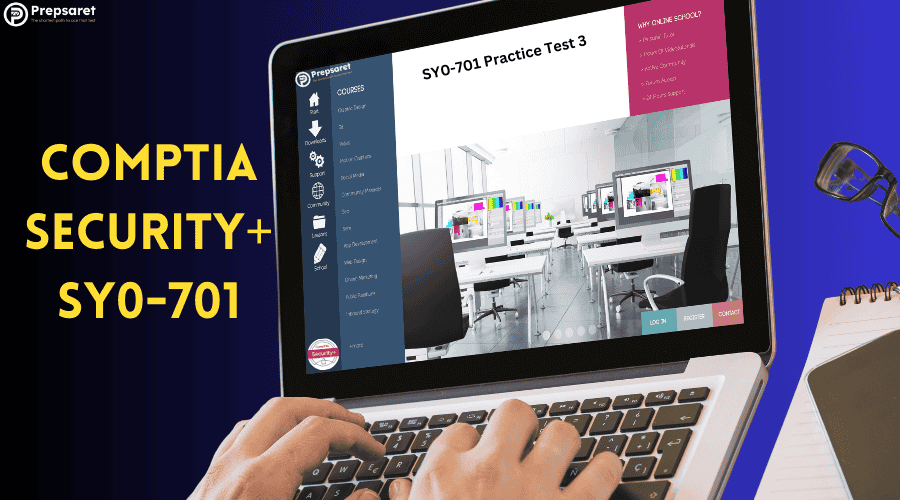
- Official certification study guides
- Online courses from platforms like Prepsaret CompTIA Security+ Test Prep, Pluralsight, and Coursera
- Practice exams and flashcards
- Virtual labs for hands-on experience
- Study groups and discussion forums
Practical Tips for Passing a Cloud Security Certification Exam
- Manage your time wisely: Study in manageable chunks and avoid cramming.
- Take multiple practice exams: Identify weak areas and focus on improving them.
- Join study groups and forums: Engaging with others can reinforce your learning.
- Understand exam objectives: Review the exam blueprint to ensure you cover all domains, including cybersecurity for cloud computing.
Cloud Security Best Practices in Line with CompTIA Security+
Beyond passing the exam, applying cloud security best practices is key to protecting cloud environments. Security+ aligns with essential security principles, including:
Encryption and Identity Management
- Use strong encryption to protect data at rest and in transit.
- Implement multi-factor authentication (MFA) and Identity and Access Management (IAM) to enhance cloud security.
Incident Response Best Practices
- Develop and follow an incident response in cloud environments to handle security breaches effectively.
- Regularly conduct cloud auditing certification assessments and penetration testing to identify vulnerabilities.
Continuous Monitoring and Compliance
- Use continuous monitoring tools to detect threats in real-time.
- Stay compliant with industry regulations like GDPR, HIPAA, and ISO 27001 through cloud governance and compliance training.
Key Domains Covered in Cloud Security Certifications
Cloud security certifications aren’t just about memorizing security principles—they cover the real-world skills needed to protect cloud environments. Here are the core domains you’ll master:
Identity and Access Management (IAM)
Ever wondered how companies keep unauthorized users out while ensuring the right people have access? IAM covers user authentication, role-based access control (RBAC), and MFA.
Cloud Security Architecture and Design
Understanding how cloud environments are structured and secured is crucial. Certifications teach best practices for designing secure cloud solutions using frameworks like Zero Trust and Defense in Depth.
Risk Management and Compliance
Cloud security isn’t just about keeping hackers out—it’s also about meeting industry standards like ISO 27001, NIST, and GDPR. This domain focuses on identifying risks and ensuring compliance with regulations.
Network Security in Cloud Environments
Firewalls, encryption, and secure network segmentation—this domain covers the essentials of keeping cloud traffic safe from cyber threats.
Security Monitoring and Threat Detection
Cyberattacks can happen at any time, so real-time monitoring and incident response in cloud environments are key. Learn how to detect, respond to, and prevent security incidents using SIEM (Security Information and Event Management) tools.
Benefits of Earning a Cloud Security Certification
Why should you pursue cybersecurity certification for cloud security? Here’s what’s in it for you:
- Higher salary potential: Certified professionals earn significantly more than non-certified counterparts. Some cloud security roles offer six-figure salaries!
- More job opportunities: Companies need skilled cloud security experts, and certification proves you have the knowledge they’re looking for.
- Enhanced credibility: Employers and clients trust certified professionals more because they’ve demonstrated proven expertise.
- Career flexibility: Whether you want to work for a Fortune 500 company or freelance as a security consultant, career opportunities with cloud security certifications are vast.
Find out: What Is Cybersecurity
Cloud Security Job Roles and Career Opportunities
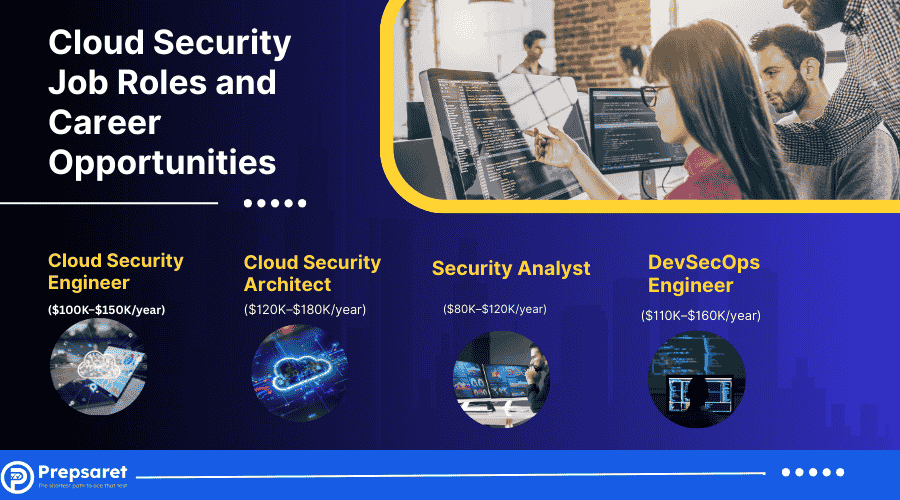
Once certified, you can step into exciting roles such as:
- Cloud Security Engineer ($100K–$150K/year) – Builds and maintains secure cloud environments.
- Cloud Security Architect ($120K–$180K/year) – Designs secure cloud systems and strategies.
- Security Analyst – Cloud ($80K–$120K/year) – Monitors security threats and ensures compliance.
- DevSecOps Engineer ($110K–$160K/year) – Integrates security into development workflows and DevSecOps certification.
Related blog post: Cybersecurity Jobs
Common Threats to Cloud Security and How to Mitigate Them
Cloud security isn’t just about prevention—it’s also about being prepared for real-world threats. Here are some major risks and how to tackle them:
- Data Breaches: Sensitive data falling into the wrong hands? Prevent this by using strong encryption, data masking, and access controls.
- Misconfigured Cloud Settings: A simple configuration mistake can expose entire systems. Use automated security audits and configuration management tools to catch vulnerabilities before attackers do.
- Insider Threats: Not all threats come from hackers—sometimes, they’re inside the company. Reduce risk with strict access controls, employee training, and behavior monitoring.
- DDoS Attacks: Distributed Denial of Service (DDoS) attacks can shut down services. Use cloud-based DDoS protection, load balancing, and rate limiting to keep your systems running smoothly.
Choosing the Right Cybersecurity Certification for Cloud Security
With so many certifications available, how do you pick the right one? Here’s a quick guide:
Best Certifications for Beginners
- CompTIA Security+ – Great for building fundamental security knowledge.
- AWS Certified Cloud Practitioner – Perfect for those new to cloud security.
- Entry-level cloud security certifications like Certificate of Cloud Security Knowledge (CCSK) are ideal for starting out.
Best for Mid-Level Professionals
- Certified Cloud Security Professional (CCSP) – Covers cloud security best practices across multiple platforms.
- AWS Certified Security – Specialty – Ideal for professionals focusing on AWS security.
Best for Experienced Pros
- Certified Information Systems Security Professional (CISSP) – A gold standard in cybersecurity.
- Google Professional Cloud Security Engineer – Best for securing Google Cloud environments.
- Microsoft Certified: Azure Security Engineer Associate – Great for Azure-focused professionals.
- Top cloud security certifications for IT professionals in 2025 also include advanced options like DevSecOps certification.
Cloud security is a dynamic and evolving field, and earning a cybersecurity certification for cloud security can position you for success. Whether you’re pursuing an entry-level cloud security certification or advanced advanced cloud security certifications like CCSP, these certifications validate your skills and enhance your career prospects.
With the right cloud security certification path, you can establish yourself as a leader in this critical area of cybersecurity.
FAQs
Is Cloud Security Part of Cybersecurity?
Yes, cloud security is part of cybersecurity. It focuses on protecting data, applications, and infrastructure within cloud environments from threats using strategies like encryption and identity management.
Is Cloud Security Certification Worth It?
A cloud security certification is worth pursuing for IT professionals as it validates expertise, enhances job prospects, and aligns with the increasing demand for skilled cloud security specialists.
How To Become Cloud Cyber Security?
To become a cloud cybersecurity professional, gain foundational IT knowledge, specialize in cloud platforms like AWS or Azure, and pursue certifications such as CCSP or CCSK. Practical experience in data protection is also essential.
Is Cloud Security High Paying?
Cloud security roles are typically high-paying due to their demand and specialized nature. Professionals in this field can earn significant salaries, often exceeding £62,500 annually depending on experience and location.
Is CCSP Harder Than CISSP?
CCSP is generally considered less challenging than CISSP. While CCSP focuses on cloud-specific topics, CISSP covers broader cybersecurity domains, requiring deeper expertise across diverse areas.
Start Your Cloud Security Certification Journey Today!
Cloud security certifications open doors to exciting, well-paying careers protecting organizations from cyber threats. Whether you’re just starting with CompTIA Security+ or aiming for advanced credentials like OSCP or GPEN, these certifications validate your skills to employers.
Ready to begin? Prepsaret’s comprehensive study resources provide the practice exams, study guides, and expert tips you need to prepare confidently for certification exams. Don’t wait to start your journey into one of today’s most in-demand tech fields

